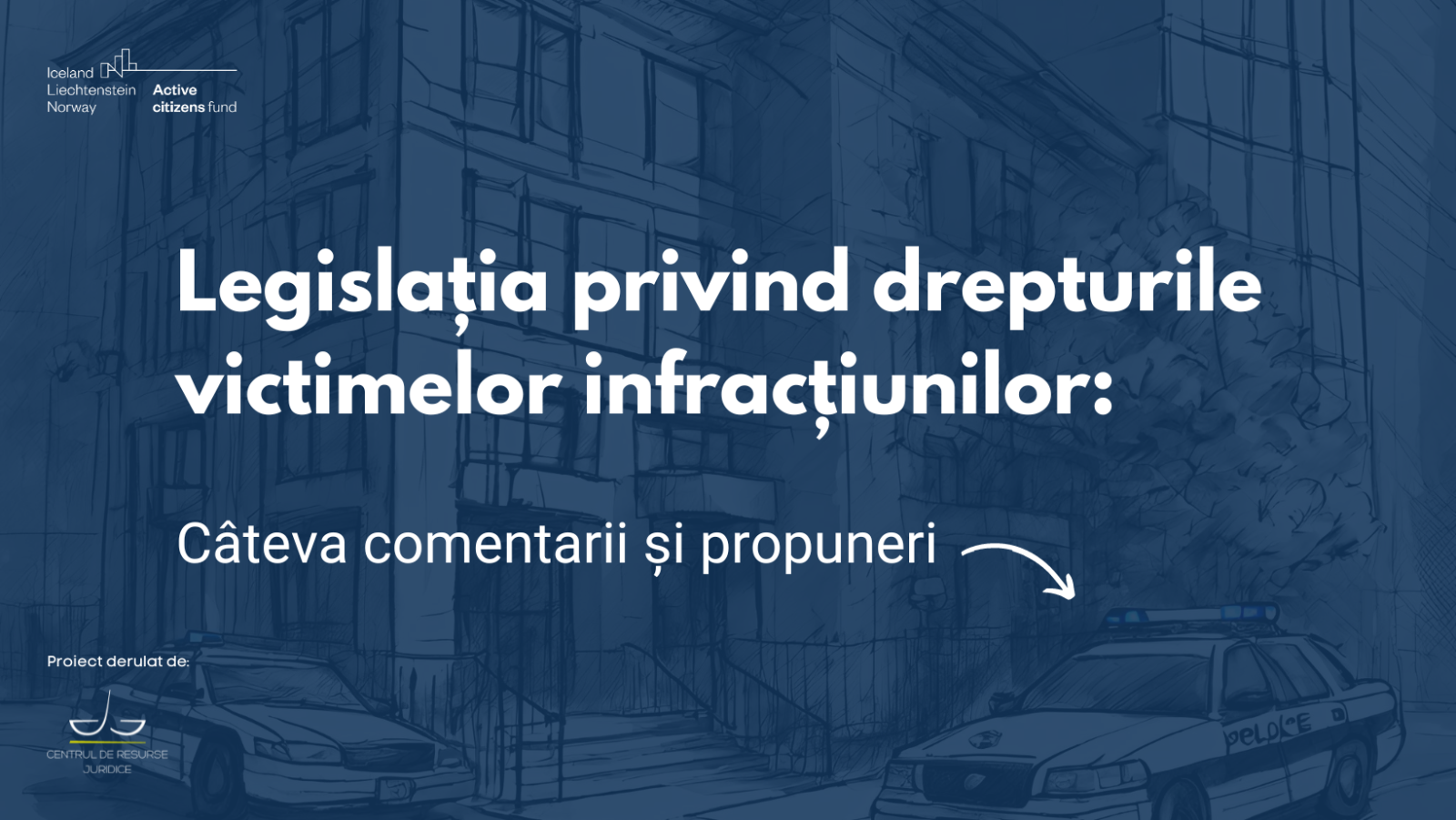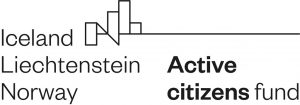Preamble
This paper aims to analyse the transposition into national law of Directive 2012/29/EU establishing minimum standards on the rights, support and protection of victims of crime, and how this Directive is actually implemented in Romania. Last but not least, we will analyse the new amendments made through other supplementary or implementing rules adopted in 2022 and 2023, i.e. to what extent the subject matter has been correctly chosen and whether these amendments make it more difficult or, on the contrary, simplify the victim’s access to financial compensation.
Read the full document, in Romanian language, here.
Excerpts:
Transposition of Directive 2012/29/EU of the European Parliament and of the Council establishing minimum standards on the rights, support and protection of victims of crime
The right to legal aid must be, according to the Directive (art.14), guaranteed to victims. They must also have the right to:
– reimbursement of expenses incurred as a result of participation in criminal proceedings
– restitution of property
– the right to obtain in criminal proceedings a decision on compensation from the offender (…)
The Directive contains minimum standards which Member States must implement by integrating into national law the necessary rules to transpose it.
Law 211/2004 on measures to ensure information, support and protection of victims of crime
Article 14 of Law 211/2004 refers to the conditions under which free legal aid may be granted, on request, to:
- persons against whom an attempt has been made to commit the crimes of murder, aggravated murder, as referred to in Articles 188 and 189 of the Criminal Code, a crime of bodily harm, as referred to in Article 194 of the Criminal Code, an intentional crime resulting in the bodily harm of the victim, a crime of rape, sexual assault, sexual act with a minor, sexual corruption of minors, provided for in Articles 218 to 221 of the Criminal Code;
- the spouse, children and dependants of persons who died as a result of committing the crimes of murder, aggravated murder, as referred to in Articles 188 and 189 of the Criminal Code, as well as intentional crimes resulting in the death of the person.
Victims of human trafficking also have the same rights to free legal assistance under Law No 678/2001 on preventing and combating human trafficking, a special law which refers, in Article 44(1) subparagraph 2, to the right of victims enshrined in Chapter IV of Law 211/2004.
If the victim has suffered a crime other than those referred to in Article 14(1) of Law 211/2004, they may apply for free legal assistance provided that the monthly income per family member of the victim amounts up to the basic minimum gross national salary established for the year in which the victim applied for free legal assistance.
Law no. 211/2004 contains at the end a number of 3 annexes, all of them containing since 2007 (by GEO no. 113/2007) the form for the application for compensation in cross-border situations, the model of the acknowledgement of receipt and the form for the transmission of the decision on the application for compensation. For applications for compensation in situations that took place within the country’s borders, there are no such forms/models, which means that Romanian citizens, victims of crime on Romanian territory, are not provided with such a form, which leads to a situation of legal inequality.
- Comment: The form referred to in Article 4 does not exist, as such, at the end of the law, where other types of forms exist. The following questions therefore arise: does it exist and is it uniform throughout Romania?
- Proposal: The form should be included in the body of the law, as the rights conferred by its contents are not mere wishes.
Free legal aid is granted to each victim throughout the process, up to an amount equivalent to two gross minimum basic salaries per country, established for the year in which the victim applied for free legal aid, with the funds being made available from the state budget, through the Ministry of Justice budget (Article 18).
- Proposal: There is a need for data collection on the number of victims, categories of offences (for shaping the criminal policy) and amounts of money allocated in a calendar year to free legal assistance by the Ministry of Justice in order to make the legal texts effective.
Who provides legal aid?
Free legal aid can be provided by a lawyer chosen by the victim or by a lawyer appointed by the Bar if the victim does not have a lawyer of their choice. Thus, the decision that grants free legal assistance must also include the appointment of an ex officio lawyer in accordance with Law No 51/1995 on the organisation and practice of the legal profession and the Statutes of the legal profession, if the victim has not chosen a lawyer.
It can be concluded that, even if the victim has chosen a lawyer, they are entitled to the fee fixed by law, just as the public defender.
According to the data provided by the Public Prosecutor’s Office at the request of the FILIA Centre, in 2022 there were 4,467 cases of rape (Article 218 of the Criminal Code) being investigated by the prosecution units. The number of requests for free legal assistance was 82. In regard to the offence of sexual act with a minor (Art. 220 Criminal Code), the total number of cases pending in the prosecutor’s offices in 2022 was 7034 cases and the number of requests for free legal assistance was 127. This shows an extremely low number of applications, which may have the following causes:
1. Lawyers are unaware of the victim’s entitlement to legal assistance.
2. The provisions of the Code of Criminal Procedure, which are much more constraining in terms of legal assistance to the injured party, are the ones mainly applied, namely Article 93 of the Code of Criminal Procedure.
3. Information for victims is not available or not easily understandable (accessible).
Comment: legal assistance is mandatory if the injured party is a minor. We can thus assume that in the 7034 cases concerning the crime of sexual act with a minor, they had at least one ex officio lawyer or a lawyer of their choice since, according to art.93, para.4 of the Criminal Procedure Code, the legal assistance of the minor being mandatory. Of these, only 127 applied for public legal aid, i.e. 1.8%.
According to the Protocol concluded between the UNBR (The National Union of Romanian Bar Associations), the PICCJ (Prosecutor’s Office attached to the High Court of Cassation and Justice) and the Ministry of Justice on legal fees in civil and criminal matters, the fee for a lawyer appointed ex officio for representation of the injured party during criminal proceedings, preliminary chamber proceedings or during the trial is 510 RON. Assuming that the same public defender would go through all stages of the procedure, their fee would be 2040 RON. However, the fee due in the case of the special law (Law No 211/2004) is the amount of 2 gross minimum wages, i.e. 6000 RON.
Financial compensation is granted on request:
- persons against whom an attempt has been made to commit the crimes of murder, aggravated murder, as referred to in Articles 188 and 189 of the Criminal Code, a crime of bodily harm, as referred to in Article 194 of the Criminal Code, an intentional crime resulting in the bodily harm of the victim, a crime of rape, sexual assault, sexual act with a minor, sexual corruption of minors, provided for in Articles 218 to 220 of the Criminal Code, a crime of trafficking in persons and trafficking in minors, provided for in Articles 210 and 211 of the Criminal Code, an offence of terrorism, and any other intentional offence committed with violence;
- the spouse, children and dependants of persons who have died as a result of offences referred to in paragraph 1. (1).
The conditions for granting compensation are the same as for free legal assistance, as regards the obligation to refer the matter to the prosecution authorities.
Article 30(3) of Law 211/2004 stipulates that the advance shall be granted to the victim only if they are in a precarious financial situation.
- Comment: the text does not stipulate how financial precariousness is to be demonstrated; while we do not consider that the legislator should have made it incumbent on the victim to obtain a certain number of documents for demonstrating this, we believe, however, that the text is extremely evasive.
- On the other hand, it should be noted that the maximum amount of the advance coincides with the maximum amount representing the financial compensation, i.e. the amount of 10 gross minimum wages. However, since this is an advance, it should be different from the total amount of the compensation.
New legislative changes
By GD no.541/2023 the Government approved the Methodology for issuing, distributing and settling vouchers for victims of crime, for establishing their amount, as well as the criteria for selecting the public and private entities enrolled in the granting mechanism. At the basis of this methodology are the amendments made by Law no.230/2022 to the Law on the establishment, organisation and functioning of the National Agency for the Administration of Seized Assets (ANABI), respectively Law no.318/2016.
- Comment: we consider that the fragmentation of the subject matter (financial compensation to victims of crime) between the main law, i.e. Law 211/2004 and Law 230/2022, will lead to practical difficulties, especially as the latter establishes rules derogating from the common law, i.e. Law 211/2004.
- Problem that may arise in practice: in the absence of concrete information and specialised training sessions, the current legal framework may be applied unevenly across the country.
Article 37^15 of Law 230/2022 provides for the granting of an advance of the requested financial compensation, in the form of a voucher, in the amount of 5 gross minimum wages per economy corresponding to the year in which the request was made, in order to cover current needs, as described above. However, the advance on the compensation provided for by Law No 211/2004, amounting to 10 gross minimum wages, is based on the victim’s financial precariousness. However, as Article 37^14 of Law No 230/2022 expressly provides that it contains derogating rules, the provisions of the latter law will apply.
- Note: Law 230/2022 provides for the possibility for victims to request, by way of derogation from the provisions of Art. 27 para. (1) of Law 211/2004, financial compensation for non-material damage suffered as a result of the crime, without, however, indicating a maximum amount of such compensation.
Procedure for issuing vouchers
The victim will submit to the Commission the application for the voucher and the report estimating the costs of meeting urgent needs. According to the methodology, public and private entities may provide support and assistance to victims of crime by completing the report of estimated expenses for covering needs and, when appropriate, by assisting the victim before the Commission.
- Comment: Assuming that this new procedure will work in practice, bearing in mind that the vouchers represent an advance on the financial compensation, the procedure being described in GD 541/2023, the question arises: who will grant the financial compensation or the rest of the financial compensation (if the victim has requested an advance)? Law 230/2022, let alone GD 541/2020 (as it is a hierarchical inferior act), does not contain any such clarification. As a result, will the common law on the matter, i.e. Article 33(2), apply and will the payment or the remainder of the payment be made by the courts through their financial departments?
- Proposal: The source material must be unique, otherwise information and support for the victim of the crime remains a mere wish. Therefore, the amendments should be contained in Law 211/2004 and not in other legislation derogating from the main law. On the contrary, Law no.318/2015 for the establishment, organisation and functioning of the National Agency for the Administration of Seized Assets should harmonised with the main seat of the matter, namely Law no.211/2004. This would comply with the rules of legislative technique, would make it easier to identify the rights of victims (the purpose of the law, by the way) and, implicitly, to effectively enforce them.



